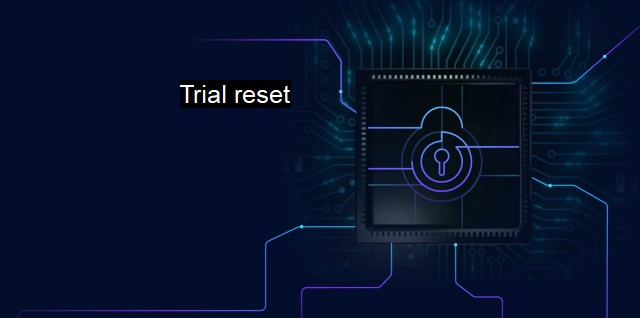What is Trial reset?
The Unseen Danger: Understanding Trial Reset and Its Implications in Cybersecurity and Antivirus Protection
Trial reset is a software technique widely used by users and professionals within the domain of cybersecurity to extend the trial periods of various in-demand applications or antivirus programs. This technique can be beneficial for users to test the efficiency and usefulness of a particular software or program for an extended period before making an actual purchase. it's important to note that accessing or using such trial reset programs often involves overriding the in-built limits implemented by the original software developers. Therefore, despite its potential benefits, it is clearly located within a grey area in terms of its legality and ethical orientation.The trial reset process revolves around manipulation of the system registry or the use of additional programs to intermittently erase user data and restore it back to the status of a fresh installation. Each software or application has a list of registry values where it may store the period of necessary usage like the date of installation or the expiration of the trial period. Trial reset tools work by locating these variables and modifying the records pertinent to software's trial data. Consequently, the software becomes 'tricked' into assuming it's fresh from an installation and therefore resets its trial timeframe.
One context in which trial resets play a significant role is in antivirus programs which are very crucial in cybersecurity. With the vast majority of people nowadays reliant on different kinds of software to protect their systems against malicious threats, antivirus software is in high demand. Most antivirus software providers offer products that require payment after an evaluation period. some discerning users resort to using trial resets to get around paying for these services. Although this might help some users save on purchase costs, it remains contentious because it might violate the policies or terms of services agreed upon when downloading the software.
From a cybersecurity perspective, the use of trial reset is both advantageous and disadvantageous. On one hand, trial resets may be viewed as a way to fight back against the over-commercialization of utility and safety, empowering users to take control of their own security for no cost. On the other hand, trial reset tools can inadvertently become conduits for malware. Some malicious entities might bundle these tools with dangerous scripts and not only reset a user's antivirus software trial period but also inject harmful malware into their system unknowing to them.
Using trial resets sustains a fake sense of security, as the lack of updates after the initial trial period can leave the user's system vulnerable to new threats. Most of these unauthorized versions are not eligible for important updates intended by original developers and progressively become less effective in tacking emerging cyber threats.
The ethics and legality of trial resets are often contested. While it enables users to use a service longer than intended by the developers, it might infringe user agreements or intellectual property rights, which could result in serious consequences for violators.
"trial reset" serves as a software method used primarily to prolong the utilization period of an application or software, particularly antivirus programs. While it might be tempting to use these trial reset techniques to extend the duration of free usage, it is recommended to be cautious because of the potential legal ramifications and also the potential risks to the cybersecurity of a system or network. In the evolving landscape of cybersecurity law, the legal and ethical nuances surrounding modifications to proprietary software continue to give rise to significant debates.

Trial reset FAQs
What is a trial reset?
A trial reset is a technique used to reset the trial period of a software application. It involves manipulating system settings to trick the application into thinking it's being installed for the first time, which resets the trial clock.Is trial reset legal?
It depends on the specific terms and conditions of the software license agreement. In some cases, trial reset may be considered a violation of the agreement and could result in legal action. It's important to read and understand the license agreement before attempting to use a trial reset method.Can trial reset be detected by antivirus software?
In some cases, yes. Antivirus programs may detect trial reset tools as potentially unwanted software or malware if they're not from a reputable source. Additionally, some software applications have built-in mechanisms to detect and prevent trial reset.Are there any risks associated with using trial reset tools?
Yes, there are potential risks to using trial reset tools. Using unauthorized methods to extend a software's trial period may result in the application not functioning correctly and could potentially expose your computer to security risks. It's important to use reputable trial reset tools and to monitor your computer for any unusual activity after using them.| | A | | | B | | | C | | | D | | | E | | | F | | | G | | | H | | | I | | | J | | | K | | | L | | | M | |
| | N | | | O | | | P | | | Q | | | R | | | S | | | T | | | U | | | V | | | W | | | X | | | Y | | | Z | |
| | 1 | | | 2 | | | 3 | | | 4 | | | 7 | | | 8 | | |||||||